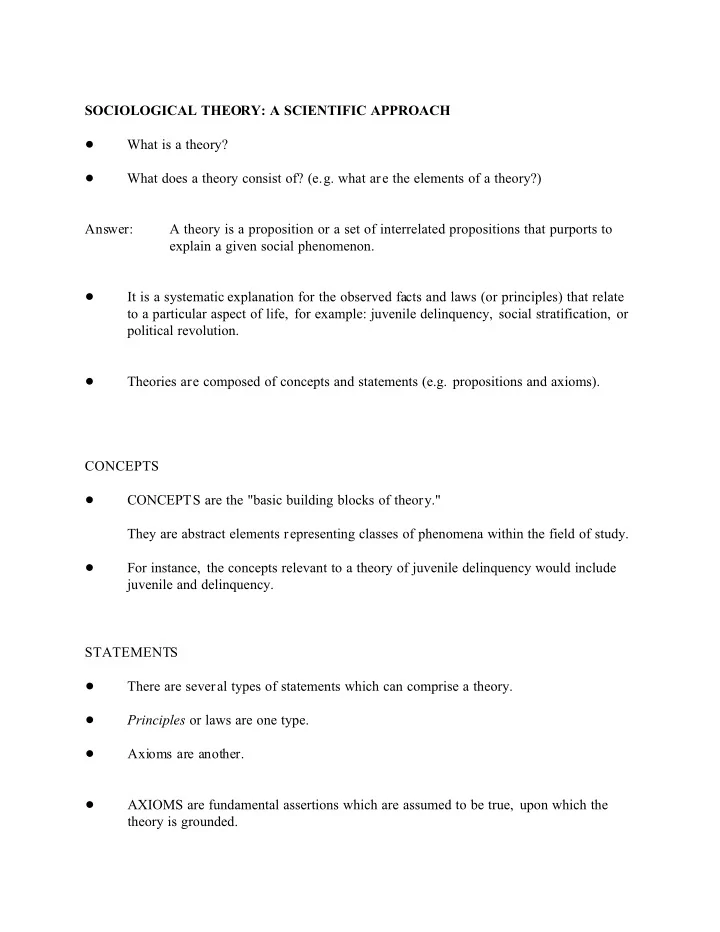

SOCIOLOGICAL THEORY: A SCIENTIFIC APPROACH What is a theory? � What does a theory consist of? (e.g. what are the elements of a theory?) � Answer: A theory is a proposition or a set of interrelated propositions that purports to explain a given social phenomenon. It is a systematic explanation for the observed facts and laws (or principles) that relate � to a particular aspect of life, for example: juvenile delinquency, social stratification, or political revolution. Theories are composed of concepts and statements (e.g. propositions and axioms). � CONCEPTS CONCEPTS are the "basic building blocks of theory." � They are abstract elements representing classes of phenomena within the field of study. For instance, the concepts relevant to a theory of juvenile delinquency would include � juvenile and delinquency. STATEMENTS There are several types of statements which can comprise a theory. � Principles or laws are one type. � Axioms are another. � AXIOMS are fundamental assertions which are assumed to be true, upon which the � theory is grounded.
PROPOSITIONS PROPOSITIONS are conclusions drawn about the relationships among concepts, based � on the logical interrelationships among the axioms. HYPOTHESES HYPOTHESES are specified expectations about empirical reality, derived from � propositions. VARIABLES A variable is the empirical counterpart to a concept. � while concepts are within the domain of theory, variables are a matter of observation and measurement. A variable is a concept which is measured (usually but not always quantitatively). � It contains two or more values or categories that can vary over time or over a given sample (e.g. age).
THEORY: The Traditional Scientific Approach The TRADITIONAL (or classical approach) consists of three stages. � Stage 1 is what takes place at the conceptual level. � It consists of defining the concepts a writing a proposition stating a relationship between them. Stage 2 bridges the gap between the conceptual and empirical levels. � It consists of devising ways to measure the concepts empirically. This stage includes writing a testable hypothesis that links the empirical measures of the � two concepts. The hypothesis of stage 2 is identical to the proposition of stage 1 except that stage 2 is � on the empirical level (relates empirical measures) while stage 1 is on the conceptual level and cannot be tested as it contains no empirical measures. Stage three (the final stage) consists of gathering and analyzing data in an attempt to � verify the hypothesis.
THEORETICAL--EMPIRICAL TRANSLATION: EXAMPLE Problem (or research question): � Why is there more violence in urban than rural areas? Concept (or theoretical variable) #1: density � [Conceptional definitions need to be provided -- I' ve skipped this step.] Concept (or theoretical variable) #2: aggression � [Conceptional definitions need to be provided -- I' ve skipped this step.] Proposition (or theoretical hypothesis): � Aggression is positively correlated with human density. Operational Definitions (variables, empirical variables, or empirical indicators). � density: is measured by the number of people per square kilometre as indicated by the Canada Census. aggression: number of assaults as indicated by police records. Hypothesis (empirical hypothesis, or empirical expectation): The greater the number of people per square kilometre, the greater the number of assaults.
Recommend
More recommend